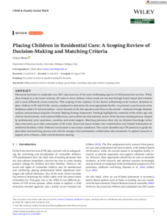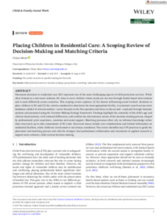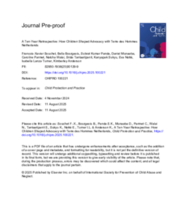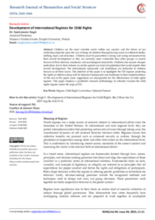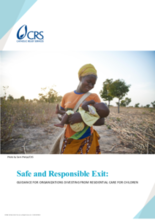Displaying 91 - 100 of 4424
The International Labour Organization (ILO) and Innovations for Poverty Action (IPA) are working with the international community to develop Global Research Priorities for Combating Human Trafficking/ Forced Labour.
This short film was produced by the Global Youth-Led Movement on Ending Violence Against Children for the launch of the World Health Organization’s first-ever report on the public health impact of corporal punishment of children (August 2025).

This technical report, from WHO, describes the prevalence, risk factors for, and consequences of child corporal punishment, which it defines as “any punishment in which physical force is used and intended to cause some degree of pain or discomfort, however light”.
Date: Wednesday 20 August 2025 14.00 – 15.00 CEST
Join the World Health Organization (WHO) for the global launch of its landmark report recognising corporal punishment of children as a public health concern.
This scoping review examines how social workers decide to place children in residential care and how facilities are selected, drawing on 10 global studies analyzed through the Decision-Making Ecology framework. Findings reveal that decisions are often shaped by a child’s age, clinical needs, and professional discretion, but frequently lack structured assessments, consistent child involvement, and reliable information—pointing to the need for stronger collaboration and research to support more child-centred practices.
This article reviews research on how social workers decide to place children in residential care and how facilities are selected, highlighting the complexity and discretion involved in these decisions. It underscores the influence of factors such as children’s age, clinical needs, professional judgment, and limited information on facilities, while calling for more structured, child-centred approaches and stronger collaboration across services.
This article presents an in-depth analysis of children and young people's engagement in Terre des Hommes Netherlands (TdH NL) influencing work over the past 10 years. It underscores the importance of integrating children's voices into decision-making processes to ensure systemic change and the sustainable protection of children's rights.
This paper critically examines the international child rights regime under the auspices of the United Nations, highlighting its historical foundations, key challenges, and the role of global institutions in safeguarding children’s rights. Employing a qualitative research methodology, the paper also offers recommendations to strengthen the effectiveness of child rights protections worldwide.
The Safe and Responsible Exit Guidance developed by Catholic Relief Services provides a structured framework for organizations transitioning away from financial and technical support of residential care facilities. This guidance emphasizes ethical divestment that prioritizes child safety and supports ongoing care reform.
In this book about the birth of our species, The Origin of Language argues that it was not hunting, fighting, or tool-making that forced early humans to speak, but the inescapable need to care for our children.


